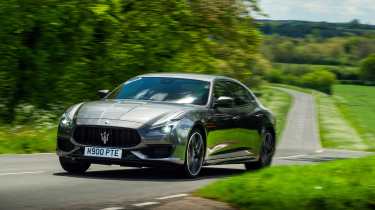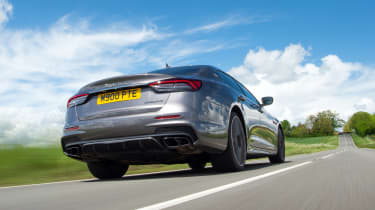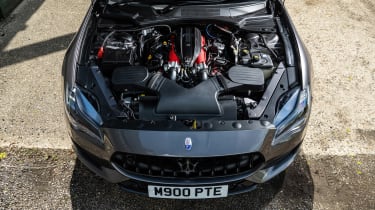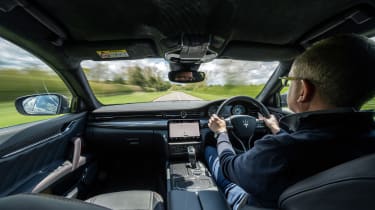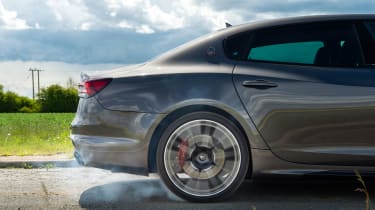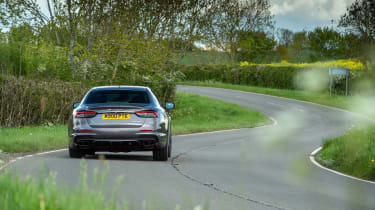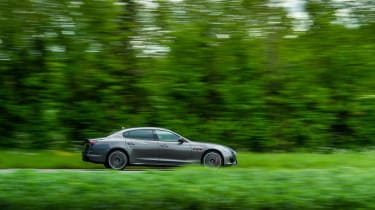Maserati Quattroporte (VI, 2013 - 2023) review – a fun, but ultimately flawed sports limo
It’s not perfect, but the final Quattroporte is a fine alternative to more conventional supersaloon rivals, especially in its more potent forms
The Maserati Quattroporte kept a low profile in its final years, with its maker spending the majority of its time on the Levante SUV, revealing a hybridisation strategy for the smaller Ghibli saloon and throwing its mid-engined MC20 into the supercar arena. The Italian supersaloon then met its end for good in 2023, with no replacement in sight.
In the ten years the sixth generation Quattroporte was in production, BMW and AMG both introduced two generations of M5 and E63 respectively, with Audi launching two new RS6s in that time and Jaguar killing off the XJ. And still, the Quattroporte catches your eye when you see it loitering in a car park, and not solely because you’ve exclaimed ‘Look! It’s a Quattroporte! When was the last time you saw one of those?’ but because it still looks refreshingly cool compared to its more uptight German rivals.
> Maserati GranTurismo Trofeo review
Well, from the front it does, its oversized grille and low nose giving it a pseudo-hot-rod look combined with Italy’s answer to today’s trend for exaggerated frontal design. The rear is less successful, lacking in any flair or detail, but the low-slung appearance and simple approach to the four-door’s design results in a car that has to work less for your attention.
Engine, transmission and 0-60mph time
For the range-topping Trofeo model, which replaced the GTS, Maserati had a thorough read of the ‘how to upgrade your supersaloon’ handbook. From discrete external detailing amounting to some red flashes on the front wheel arches, red stitching inside and carbonfibre liberally applied inside and out. There is more to the mechanical upgrades, starting with the Ferrari V8. Capacity stays at 3.8-litres, but there is a new pair of twin-scroll turbochargers that have a new internal turbine design, with both relying on a single intercooler. Inside the engine, the pistons and con-rods are a new design to allow the engine to achieve its higher peak outputs more efficiently, with new camshafts and valves installed within a pair of freshly designed cylinder heads to improve combustion efficiency and performance.
More reviews
Those hoping for a roaring V8 on start-up will be disappointed because it’s an incredibly quiet and refined engine note that belies the 572bhp available – up from the GTS’s 527bhp. Mated to the ubiquitous ZF eight-speed gearbox it makes for an impressively refined powertrain with credit to those responsible for the mapping that has resulted in an unexpected cohesion between engine speeds and ratios, something that not all rivals can claim. In Drive, it takes some clumsy driver inputs to instigate a flare of revs with an unnecessary downchange or the embarrassment of hanging on to a gear for too long. You can of course use the well sized and neatly crafted paddles (mounted to the steering column for a bonus point), and you find yourself doing so more often than not because the Trofeo feels like that kind of car, one that encourages you to be part of the proceedings.
Extend the V8’s revs and it manages to deliver sprightly rather than explosive performance, at 2000kg it’s never going to feel feral with 290bhp per ton at its disposal, but 538lb ft certainly helps keep the midrange alive although the engine feels it’s running out of shove before the 6750rpm peak. Despite this, a glance at the speedo indicates you’ve reached a higher speed much sooner than you thought you would.
As well as using the paddles more often than leaving the ZF unit in auto, selecting Sport, of the three drive modes available - ICE and a new Corsa mode are also an option - sharpens the responses to provide a small additional layer of interaction. And when pushed the big Trofeo doesn’t feel it will trip over itself.
Drop back to the GTS GranSport of 2016, and you get a previous iteration of the same Ferrari-built twin-turbo V8, producing 523bhp and 479lb ft of torque. It’s an oily-smooth engine in operation, but its note won’t make your grin from the moment you twist the key in the ignition. Devoid of any limiter, its 194mph top end makes it the quickest V8 saloon on the market. 0-62mph takes 4.7sec.
ZF’s familiar eight-speed ‘HP70’ ‘box is still the sole transmission choice, with 100ms shifts. It’s a great partner for the V8, and can be shifted manually either by sturdy, tactile metal paddles behind the steering wheel or via the central shift lever. It’ll let the engine head-butt the limiter in manual mode, but will also rather confusingly kick-down beyond an ill-defined point in the throttle pedal’s arc.
Shortly after launch, the Quattroporte was also available in S form with another Ferrari-derived engine, only with two fewer cylinders. Its V6 came off the production line at Ferrari producing 404bhp, supported by 406lb ft of torque that arrives at just 1750rpm and doesn’t drop off much after that. Put crudely, the engine is essentially a chopped-down version of the V8 that the new QP was launched with, but with its V angle closed from 90 to 60 degrees to make it rev more smoothly.
The turbos, combustion chambers, direct-injection system and variable valve timing are, however, much the same as the larger engine’s, as is the eight-speed ZF automatic gearbox with paddles, which executes upshifts in a twin-clutch transmission-rivalling 0.15 seconds. And because the new QP S is 130kg lighter than the old V8 at 1860kg, it’s pretty much as fast. Maserati claims a 0-62mph time of 5.1sec (4.9sec for the all-drive Q4 version, but the UK won’t be getting that as there are no immediate plans for right-hand drive) and a top speed of 177mph, figures that put it at the sharp end of the V6 limo pack.
If you want to drive your limo with the verve and gusto you’d normally reserve for a hot hatch, the Quattroporte S will look after you, merely nudging into gentle understeer if you overcook it on tighter bends while remaining pleasingly neutral in faster sweeps. The well-judged ESP calibration even allows a few degrees of rear slip in its Sport setting, though how much you’ll want to indulge in a ‘dab of oppo’ will depend on the width of the road and the consent of your rear-seat passengers (if there are any).
Ride and handling
The steering is quite light, the steering wheel diameter is also on the large side by today’s standards, but you can be precise with the front end and while there’s no detailed texture at your palms you can judge when the 21-inch Pirellis are beginning to feel the strain. But there are no surprises to how the rear-drive chassis reacts, and much of this is down to its Skyhook adaptive dampers.
Unlike its German rivals there is a suppleness to the Maserati’s chassis, with the cast iron fist approach of BMW M, AMG, Audi Sport etc replaced with a more relaxed gait, allowing it to flow with a calmness, as it breathes with the surface rather than beating it into submission.
Revisions to the Quattroporte’s geo were designed to improve and sharpen responses, while the Skyhook continuously variable dampers had also been recalibrated for a more focussed performance. There’s quite some body roll, although it looks more extreme from the outside than it feels from behind the wheel, and when it’s turned-in and settled, which it does with a clean linear motion, you can carry your speed and momentum throughout the corner as you wish rather than holding on and hoping it sticks. Its long wheelbase means it’s all very controlled with a sense that everything is happening in slow motion, any corrections requiring nothing more than a roll of the wrists to maintain the smoothness the Trofeo excels at.
The 2016 GTS goes without some of the more modern tech, but its steering still has real weight to it largely thanks to its hydraulic power assistance. That sounds like a good omen, but the benefits aren’t there in practice: there’s a surprisingly pronounced ‘sneeze factor’ around the straight-ahead, and then unnatural ramping up of weight thereafter. While there’s little to be gleaned from the rack during cornering, it also suffers from pronounced kickback over poor surfaces, compounded by a ride that can be confused by the same challenge, the variable ‘Skyhook’ dampers stumbling over larger intrusions that impact far too much into the cabin.
With the introduction of the Trofeo Maserati has also introduced a Corsa mode, which includes Launch Control (crucial for a car with a three-metre wheelbase, seating for five and enough rear legroom for Michael Jordan to stretch out…) and a setting for the dampers, throttle and gearshift above Sport mode. Unfortunately, you can’t select the Corsa engine/shift setting without having the stiffer damper setting, which undoes all of the Trofeo’s strong work of being a light on its toes super-exec-saloon. The stiffer damping adds an unnecessary harshness to the chassis that’s at odds with the car’s core attributes and brings nothing to the party. Engineers really do need to forget this whole chassis stiffness equals a performance car nonsense.
Thankfully, the Quattroporte in its Sport setting still makes for a leftfield alternative to the performance saloon offerings from both Stuttgart based manufacturers, Munich and Inglostadt.
Prices and rivals
Unfortunately, for those of you in the Maserati’s corner, there’s no doubt that its German rivals are more dynamically capable. The BMW 750i of the time drives like something that's 300kg lighter and from the class below. It might have a subtle power deficit at 523bhp, but seems to make better use of it more of the time. Audi’s S8 is less entertaining, but still rides and steers with more alacrity compared to the QP, and AMG’s most potent S-class beats all of these options into submission for the most part. But. Could you really see yourself actually buying what might otherwise be an Uber Black with some big wheels and a V8 engine?
Because while it might have been pulled from production, the Maserati is still in a league of its own, extrapolated by the fact they’re only found in any density on the islands of Papua New Guinea (look it up). Upstream is Bentley’s Flying Spur, which has a similar appeal when specified correctly, with the dynamic, tech and quality advantages to back up the extra purchase price.

